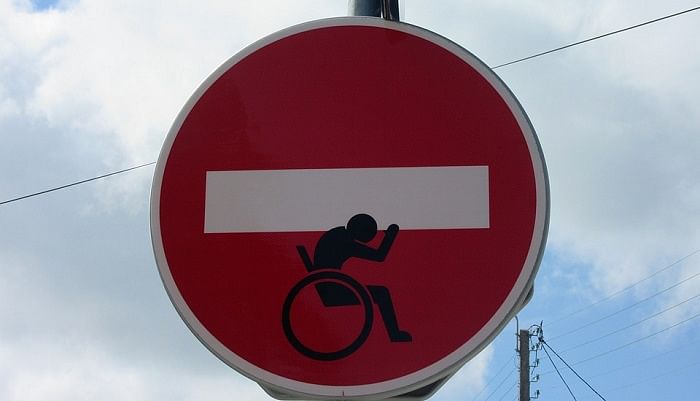As India enters Day 3 of coronavirus lockdown and draws what Prime Minister Narendra Modi called a ‘lakshman rekha’ outside every home, persons with disabilities have been left outside the doorway. Again.
Finance Minister Nirmala Sitharaman announced Gareeb Kalyan Yojana, an economic support package of Rs 1.7 lakh crore for the poor, widows and persons with disabilities (divyang) and the elderly. For people with disabilities, the government will send Rs 1,000 as a one-time payment in two instalments over the next three months.
But for the disabled, it is not just a question of money. As Indians follow social distancing by maintaining at least a metre’s distance from each other, it adds to the discrimination and isolation that the 21 million disabled Indians experience daily.
Also read: Supreme Court has let down India’s disability rights movement
New barriers, old ones unresolved
When physical contact is prohibited, and our public facilities are not disabled-friendly and barrier-free, have Indian authorities given any thought to how persons with disabilities (PWDs) will manage mobility and access services?
This was also a warning the World Health Organization (WHO), which said that unless governments take proactive steps, discrimination against people with disability will escalate.
Policy makers must take into account whether a person with vision impairment, without guidance, will be able to spot the exact location of open shops, medical stores, hospitals? Even within the hospital premises, would they be able to move around easily and seek the help they need on their own? People with cognitive disability need assistance for even accessing the government grant from their bank accounts. In the absence of accessible public facilities and assistive technologies, the disabled need human assistance. But social distancing makes it difficult.
Those staying with abled-bodied and caring family members will find some way; however, those living alone (especially women), those married to spouses who also have a disability, and those who may have children or elderly parents who also require assistance, will have to bear the challenge.
Also read: Modi govt’s draft education policy a disappointment for disabled kids, burdens parents
New barriers, old ones unresolved
Given the ignorance or discrimination attached to the specific needs of persons with disabilities, a large number of disabled people depend on organisations for lodging, food, and clothing. These organisations rest on donations and charities from corporates and wealthy individuals. What would happen to these organisations in this time of quarantine and social distancing? India’s already deteriorating economy is likely to hit them badly, as philanthropists would think twice before opening their purses.
A study undertaken by Disability Rights India Foundation (DRIF) in 2018 across 24 states found that more than half of the states had failed to even notify the rules mandated by the Rights of Persons with Disabilities (RPWD) Act, 2016. The guidelines released in 2018 by the National Disaster Management Authority (NDMA) aptly acknowledged that dearth of data about people with disability hampers the inclusion strategy.
Here are some measures that can be put in place for disabled people in this phase of Covid-19 lockdown.
First, on the Narendra Modi government’s part, an expert panel must be set up to determine ways to deal with the difficulties faced by persons with physical or intellectual disability and must come up with elaborate guidelines that are immediately implementable for such persons to access essential services and healthcare.
Second, state governments can consider providing home delivery facilities for essential commodities to support any person with a disability who could sustain self-quarantine or stay indoors.
Third, in hospitals that lack tactile pavements, carpet tactilling could be arranged, so that the visually impaired can avoid direct contact with others. Sign language boards could assist the people with a hearing challenge. Ensuring operational lifts wherever available could facilitate people with orthopaedic disability. Disability-trained medical workers can be deployed for assistance in testing, quarantine and treatment.
Fourth, the government could consider creating an alternative support arrangement system consisting of helplines, support staff and transport to facilitate people with disabilities.
Fifth, all of us need money to sustain ourselves. While we can easily use the ATMs, those with certain disabilities may not, due to either inaccessibility of premises or the machine itself. Therefore, accessible mobile banking applications are one of the steps worth considering.
Sixth, information dissemination is central to the outreach of any governmental effort. Therefore, both print as well as digital media could consider allocating more time and space for people with disability. Television programmes, PM Modi’s address to the nation should be disability friendly – with sign language and closed captioning assistance. Entertainment programmes should also be made accessible.
Finally, another aspect of social inclusion falls on every individual in their personal capacity: in a scenario like the current one, remaining connected despite social distancing becomes indispensable. While able-bodied peers can play online networked games, or communicate via stories on Instagram, or even simply call a friend on the phone, some of us may not be equally placed.
As persons with disabilities, many of us are used to facing prejudice or ignorance from many of those around us, which already makes socialising a different experience than what the average person may face. At least, social distancing must be practised without prejudice. You may feel awkward in starting a discussion with us. However, we may not even be placed to know if that first step is possible for us to take.
During the next three weeks of lockdown, you might encounter persons with disability who would require guidance to navigate to the hospital, medical stores or places to fetch essential commodities. It would help if you are mindful of and acknowledge the barriers we face and call for policy changes.
The author is a third-year student at National Law University Delhi. Views are personal.
